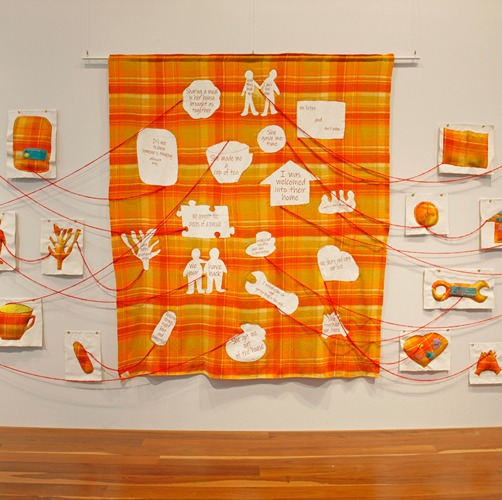
A study into the importance of peer-to-peer support for vulnerable families has been brought to life at The Bob Hawke Prime Ministerial Centre, University of South Australia, through a new exhibition celebrating the role of social connection and agency in building stronger communities.
The mixed-media exhibition Gestures of Care invites audiences to engage with powerful stories of families who have faced tough times and, through peer-to-peer support, found renewed strength and hope.
Exploring how care in everyday life can empower and drive social change, the exhibition features works by 70 participants (including children) in Adelaide-based community program Family by Family, which has been recognised nationally and internationally for its innovative approach to supporting families.
Highlights include a large textile 'Care Blanket' made from repurposed Onkaparinga woollen blankets, a collaborative ink painting installation, collages retelling life journeys, an animation, and two large ceramic group works.
Gestures of Care was developed from research conducted as part of an Australian Research Council (ARC) Linkage project called Situating Care, by the University of Adelaide in partnership with The Australian Centre for Social Innovation (TACSI) and Uniting Communities.
Gestures of Care was curated through exploring key research findings of the ARC project which investigated practices of care within Family by Family - a program developed by TACSI and delivered by Uniting Communities.
Participants worked alongside anthropologists, Family by Family staff, and artists from The Art Bus, to produce artworks that shared their experiences in the program, depicting themes of belonging, connection and community.
"I'm honoured to once again collaborate with The Art Bus on their extraordinary projects, celebrating the power of art as an authentic and accessible agent of social change," says Jacinta Thompson, Executive Director & Events and Exhibitions Producer of The Bob Hawke Prime Ministerial Centre, UniSA.
"This project holds meaningful insights, and sharing these through an exhibition platform offers audiences the opportunity to engage in positive dialogue through the arts. Gestures of Care invites us to creatively challenge assumptions, aligning with the Hawke Centre's commitment to social justice, diversity, and the strengthening of democracy."
Through Family by Family, people who have overcome hardship support others to make positive changes in their lives. The program's alternative, lived-experience model builds trust, agency and community resilience which are central themes in the exhibition.
Professor Megan Warin from the University of Adelaide, who led the research, says the project shows how Family by Family redefines care as a radical and transformative act.
"Our research demonstrates the way Family by Family centres radical care as a vital resource and listens to families with intention," she says.
"Families draw on their own strengths and lived experiences to support and care for each other which builds hope and transforms lives."
Among those featured in the exhibition is Katie, a sole parent to four young children. After living in a coercive relationship, she connected with Family by Family and another mother, Hayley, who had shared similar experiences.
"When I joined Family by Family, my confidence was at rock bottom, and I didn't know where to go for help," Katie says.
"Hayley helped me see what I was going through; we spent time together. It might seem like a small thing but knowing someone cared for me really made me feel better and slowly I'm getting my confidence back."
Hannah Kerley, Uniting Communities Family by Family Manager, says the exhibition highlights how everyday gestures of care can strengthen families and communities.
"Our focus is on building trust and creating a safe space for people who are often vulnerable," she says.
"Family experiences are wide ranging from dislocation, intergenerational trauma and gendered violence, homelessness, mental health challenges, lack of employment and education opportunities, and social isolation."
Find out more about Gestures of Care here.






